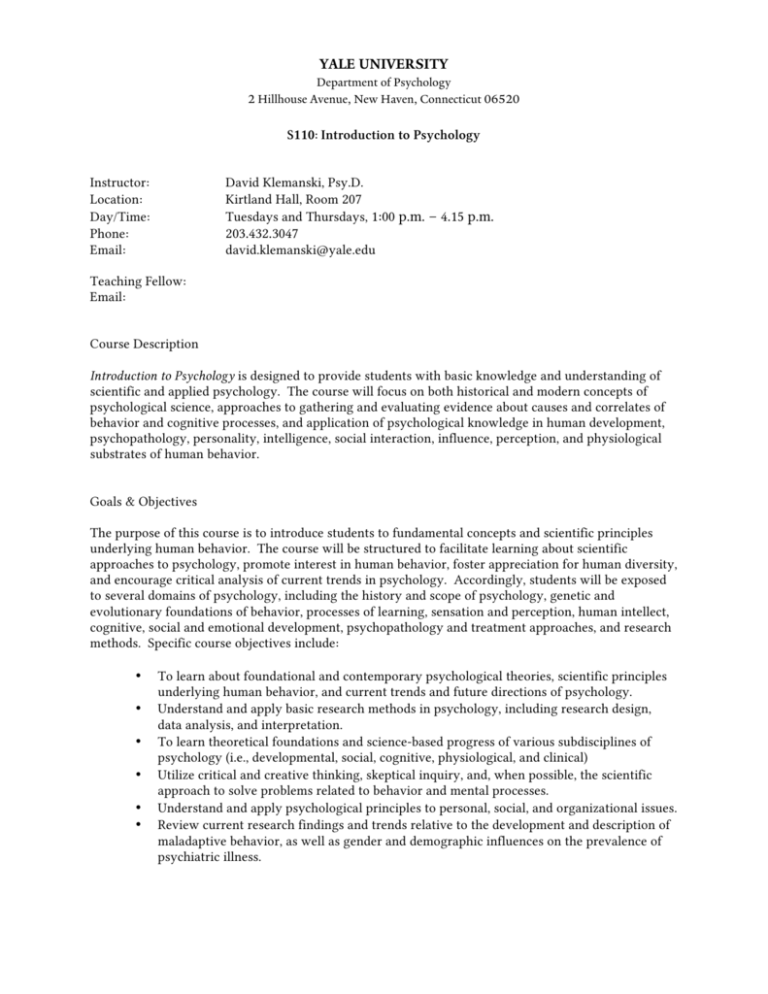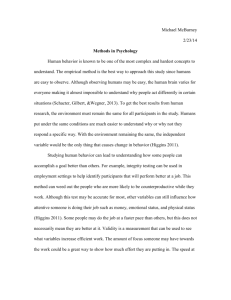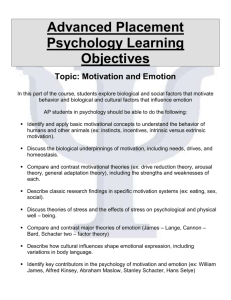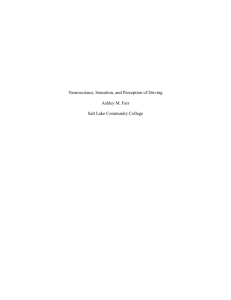
YALE UNIVERSITY
Department of Psychology
2 Hillhouse Avenue, New Haven, Connecticut 06520
S110: Introduction to Psychology
Instructor:
Location:
Day/Time:
Phone:
Email:
David Klemanski, Psy.D.
Kirtland Hall, Room 207
Tuesdays and Thursdays, 1:00 p.m. – 4.15 p.m.
203.432.3047
david.klemanski@yale.edu
Teaching Fellow:
Email:
Course Description
Introduction to Psychology is designed to provide students with basic knowledge and understanding of
scientific and applied psychology. The course will focus on both historical and modern concepts of
psychological science, approaches to gathering and evaluating evidence about causes and correlates of
behavior and cognitive processes, and application of psychological knowledge in human development,
psychopathology, personality, intelligence, social interaction, influence, perception, and physiological
substrates of human behavior.
Goals & Objectives
The purpose of this course is to introduce students to fundamental concepts and scientific principles
underlying human behavior. The course will be structured to facilitate learning about scientific
approaches to psychology, promote interest in human behavior, foster appreciation for human diversity,
and encourage critical analysis of current trends in psychology. Accordingly, students will be exposed
to several domains of psychology, including the history and scope of psychology, genetic and
evolutionary foundations of behavior, processes of learning, sensation and perception, human intellect,
cognitive, social and emotional development, psychopathology and treatment approaches, and research
methods. Specific course objectives include:
•
•
•
•
•
•
To learn about foundational and contemporary psychological theories, scientific principles
underlying human behavior, and current trends and future directions of psychology.
Understand and apply basic research methods in psychology, including research design,
data analysis, and interpretation.
To learn theoretical foundations and science-based progress of various subdisciplines of
psychology (i.e., developmental, social, cognitive, physiological, and clinical)
Utilize critical and creative thinking, skeptical inquiry, and, when possible, the scientific
approach to solve problems related to behavior and mental processes.
Understand and apply psychological principles to personal, social, and organizational issues.
Review current research findings and trends relative to the development and description of
maladaptive behavior, as well as gender and demographic influences on the prevalence of
psychiatric illness.
Introduction to Psychotherapy
Page 2 of 10
Lectures & Discussions
Information will be presented during class and via assigned readings. Classes will be structured to
accommodate individual and group participation, creative discussions, experiential activities, and
lectures. At any time during class meetings, students are encouraged to ask relevant questions to
promote educational growth and encourage collegial participation. A commitment to the coursework is
critical to the overall value of learning clinically appropriate therapeutic techniques to promote
competent professional development.
Texts
Required
nd
•
Schacter, D. L., Gilbert, D. T., & Wegner, D. M. (2011). Psychology (2 edition). New York, NY:
Worth Publishers.
(http://www.coursesmart.com/9781429237192?__professorview=false&__instructor=2840097)
•
Marcus, G. (2005). The Norton psychology reader. New York, NY: Norton.
Optional
•
Hock, R. R. (2009). Forty studies that changed psychology: Explorations into the history of
th
psychological research (6 edition). Upper Saddle River, NJ: Pearson/Prentice Hall.
Any supplemental readings not contained in the course texts will be available electronically (via:
https://classesv2.yale.edu/portal/).
Course Requirements
Students are expected to be punctual to class, read required assignments prior to class, and fully participate in
class discussions. If a student is unable to attend class, the instructor should be notified in advance.
Assignments (including scheduled presentations) will not be accepted past their due date.
•
Participation (20%): Participation will be determined by attendance and participation in class
discussions. Specific aspects of participation include listening skills, verbal reasoning skills
(including ability to support verbal statements with evidence and/or examples), knowledge of
course material, creativity of expressed ideas, and ability to provide supportive or constructive
feedback to colleagues. Attendance is required for every class meeting and students may not
arrive late or leave early.
•
Written Assignments: (10% each; 20% total): Two papers will be due throughout the semester.
Each week, during the final class meeting, students will interactively develop a position
question (related to the class topics from that week) for potential paper topics. Students may
choose any week to write a 5 page (typed, double-spaced) position paper; papers are due one
following development of the position question. Students must submit the first position paper
any week prior to the midterm examination and the second paper prior to the final day of
regular classes (no exceptions or extensions). Papers must be written according to APA style.
Introduction to Psychotherapy
Page 3 of 10
•
Facilitation of Class Discussion (10%): Students (in groups of 3-4) should select a specific reading
assignment from the course schedule and facilitate a 20 - 30 minute class discussion on a particular
reading of personal interest. Discussants should be prepared with thought provoking discussion
questions and be able to demonstrate knowledge about the subject area by extending the reading and
balancing the subject material with other relevant research, journal articles, or book chapters.
Students will choose their groups and discussion date during the first class and discussions will begin
on the third class (June 07, 2011) and continue throughout the semester.
•
Midterm and Final Examinations (25% each; 50% total): The midterm (administered on June 16,
2011) and final (administered on June 30, 2011) examinations will consist of multiple choice, shortanswer, and essay questions on relevant course material (including class discussions, lectures, and
assigned readings). The final exam will be cumulative.
Grading & Evaluation
In an effort to maximize each student’s learning and professional development, qualitative feedback will
be provided for all completed assignments. Each assignment will receive a letter grade, which will be
converted to a weighted score based on the value of individual assignments (as indicated below). Each
student’s overall course grade will be based on the following:
•
•
•
•
Participation (20%)
Position Papers (10% each)
Class Discussion (10%)
Midterm and Final Examinations (25% each)
Final course grades will be awarded in accordance with Yale College standards and based on each
student’s academic performance.
Academic Integrity & Plagiarism
Academic integrity is a core institutional value at Yale and the strength of the University community
depends on academic and personal integrity. Academic honesty includes fairness in scholarship and
research, respect for each other, and responsibility for personal conduct. Scholarship must rest on
honest originality, including truth in presentation, diligence and precision in writing (citing works and
ideas), and acknowledging collaborations with others.
Plagiarism is the use of another person’s work, words, or ideas without permission and/or
acknowledgment. The deepest consequence to plagiarizing is a detriment to personal intellectual and
moral development; students who plagiarize do not learn and personal ethics are compromised.
Crediting sources where applicable and adding scholarly reflection will allow students to be far more
successful than simply taking credit for someone else’s work. In this course, students must be honest
and truthful in all aspects of their academic work.
Personal Use of Technology in the Classroom
Classroom meetings are an important opportunity for students to extend learning beyond assigned
readings or assignments. Accordingly, students should consistently be prepared to engage with ideas
presented during class. Personal technology, including mobile phones and laptop or tablet (e.g., iPad)
Introduction to Psychotherapy
Page 4 of 10
computers, may be distracting to individuals or the class group. To minimize these distractions, use of
mobile phones is not permitted during class. Phones should be turned off or silenced (no vibration
setting) in preparation for class. Laptops and tablet computers may be permitted only to the extent they
are used in pedagogically purposeful ways (i.e., note taking); this policy may be amended if students are
found using personal technology in ways that are not productive or relevant to the course.
Introduction to Psychotherapy
Page 5 of 10
Course Schedule
The course schedule, including topics and readings, is subject to change. Additional readings and videos
may be assigned throughout the course. Readings and assignments should be completed in advance of
the class date.
Tuesday, July 10 (01)
Introduction and Course Overview
Review of Syllabus
The History of Psychology
•
Schacter, D. L., Gilbert, D. T., & Wegner, D. M. (2011). Chapter 1: Psychology: The
Evolution of a Science.
•
Hock, R. R. (2009). Chapter 1: Biology and Human Behavior – Are you a Natural?
Thursday, July 12 (02)
Research Methods and Measurement
•
Schacter, D. L., Gilbert, D. T., & Wegner, D. M. (2011). Chapter 2: Psychology: The
Methods of Psychological Empiricism.
•
Marcus, G. (2005). Chapter 2: Methods (How to Lie with Statistics and How to
Think Straight about Psychology).
The Human Brain
•
Schacter, D. L., Gilbert, D. T., & Wegner, D. M. (2011). Chapter 3: Neuroscience and
Behavior.
•
Marcus, G. (2005). Chapter 4: The Brain (The Man Who Mistook His Wife for a
Hat).
•
Sapolsky, R. (2009). The uniqueness of humans (video).
(http://www.ted.com/talks/robert_sapolsky_the_uniqueness_of_humans.html)
•
*Hock, R. R. (2009). Chapter 1: Biology and Human Behavior – One Brain or Two?
Discussion topics due (via email to Instructor and Teaching Fellow).
Introduction to Psychotherapy
Page 6 of 10
Tuesday, July 17 (03)
Consciousness
•
Schacter, D. L., Gilbert, D. T., & Wegner, D. M. (2011). Chapter 5: Consciousness.
Human Development
•
Schacter, D. L., Gilbert, D. T., & Wegner, D. M. (2011). Chapter 11: Development.
•
Marcus, G. (2005). Chapter 8: Cognitive Development (How the Science of Child
Development Explains What Makes Us Human; 154-163).
Thursday, July 19 (04)
Workshop on Scientific Writing and Academic Integrity
Cognitive Development: Sensation and Perception and Learning
•
Schacter, D. L., Gilbert, D. T., & Wegner, D. M. (2011). Chapter 4: Sensation and
Perception: The Doorway to Psychology.
•
Marcus, G. (2005). Chapter 5: Sensation and Perception.
•
*Hock, R. R. (2009). Chapter 2: Perception and Consciousness – Take a Long Look…
•
Schacter, D. L., Gilbert, D. T., & Wegner, D. M. (2011). Chapter 7: Learning.
•
*Hock, R. R. (2009). Chapter 2: Perception and Consciousness – It’s Not Just About
Salivating Dogs.
Class Discussion: Group One
Tuesday, July 24 (05)
Cognitive Development: Memory
•
Schacter, D. L., Gilbert, D. T., & Wegner, D. M. (2011). Chapter 6: Memory.
•
* Marcus, G. (2005). Chapter 9: Memory and Cognition.
Group Discussion: Group Two
Introduction to Psychotherapy
Page 7 of 10
Emotional Development
Guest Lecturer: Nina Shiffrin, Graduate Student (Department of Psychology)
•
Schacter, D. L., Gilbert, D. T., & Wegner, D. M. (2011). Chapter 8: Emotion and
Motivation.
•
Marcus, G. (2005). Chapter 12: Emotion.
•
*Hock, R. R. (2009). Chapter 6: Emotion and Motivation – I Can See It All Over Your
Face.
Thursday, July 26 (06)
Midterm Examination (9.00 – 10.30 a.m.)
Cognitive Development: Language
•
Schacter, D. L., Gilbert, D. T., & Wegner, D. M. (2011). Chapter 9: Language and
Thought.
•
* Marcus, G. (2005). Chapter 6: Language.
First Position Paper due on or before this class date (via email to Instructor and Teaching
Fellow).
Tuesday, July 31 (07)
Intellectual Development (11.00 a.m. – 12.15 p.m.)
•
Schacter, D. L., Gilbert, D. T., & Wegner, D. M. (2011). Chapter 10: Intelligence.
•
Marcus, G. (2005). Chapter 10: Intelligence.
•
*Hock, R. R. (2009). Chapter 4: Intelligence, Cognition, and Memory – Just How
Are You Intelligent?
Social Development: Personality and Human Differences
•
Schacter, D. L., Gilbert, D. T., & Wegner, D. M. (2011). Chapter 12: Personality:
What is it and how it is measured?
•
Marcus, G. (2005). Chapter 14: Personality.
•
*Hock, R. R. (2009). Chapter 7: Personality – Are You The Master of Your Fate?
•
*Hock, R. R. (2009). Chapter 7: Personality – Racing Against Your Heart.
Introduction to Psychotherapy
Page 8 of 10
Class Discussion: Group Six
Thursday, August 02 (08)
Social Psychology: Social Influence and Relations
(Christina Roberto)
•
Schacter, D. L., Gilbert, D. T., & Wegner, D. M. (2011). Chapter 13: Social
Psychology.
•
*Marcus, G. (2005). Chapter 13: Social Psychology
•
*Hock, R. R. (2009). Chapter 10: Social Psychology – A Prison By Any other Name.
•
*Hock, R. R. (2009). Chapter 10: Social Psychology – To Help or Not to Help.
•
*Hock, R. R. (2009). Chapter 10: Social Psychology – Obey At Any Cost?
•
*Osherow, N. (1999). Making sense of the nonsensical: An analysis of Jonestown.
th
In E. Aronson (Ed.). Reading about the Social Animal. (8 ed.) New York: Worth.
•
*Archer, J. (1996). Sex differences in social behavior: Are the social and
evolutionary explanations compatible? American Psychologist, 51, 909- 917.
Class Discussion: Group Three
Tuesday, August 07 (09)
Boy Interrupted
Stigma on Mental Illness
Guest Lecturer: Matt Lebowitz, Graduate Student (Department of Psychology)
•
Schacter, D. L., Gilbert, D. T., & Wegner, D. M. (2011). Chapter 14: Psychological
Disorders
•
Marcus, G. (2005). Chapter 16: Disorders.
•
Marcus, G. (2005). Chapter 17: Treatment.
Thursday, August 09 (10)
Final Examination (9.00 – 10.30 a.m.)
Psychiatric Disorders and Treatment
(Christina Roberto)
Introduction to Psychotherapy
Page 9 of 10
•
Schacter, D. L., Gilbert, D. T., & Wegner, D. M. (2011). Chapter 14: Treatment of
Psycholgical Disorders
•
Rosenhan, D. L. (1973). On being sane in insane places. Science, 179(70), 250-258.
•
*Hock, R. R. (2009). Chapter 9: Psychotherapy – Choosing Your Psychotherapist.
Class Discussion: Group 4
Positive Psychology (Happiness and Pleasure)
•
Gable, S. L. & Haidt, J. (2005). What (and why) is positive psychology. Review of
General Psychology, 9(2), 103-110.
Second Position Paper due on or before this class date (via email to Instructor and Teaching
Fellow).
Introduction to Psychotherapy
Page 10 of 10
**If you are using the Psychology (1st edition text), please note below class dates and corresponding
chapter assignments:
July 10 (01)
July 12 (02)
July 17 (03)
July 19 (04)
July 24 (05)
July 26 (06)
July 31 (07)
July 02 (08)
August 07 (09)
August 09 (10)
Schacter, Gilbert, Wegner (2008).
Schacter, Gilbert, Wegner (2008).
Schacter, Gilbert, Wegner (2008).
Schacter, Gilbert, Wegner (2008).
Schacter, Gilbert, Wegner (2008).
Schacter, Gilbert, Wegner (2008).
Schacter, Gilbert, Wegner (2008).
Schacter, Gilbert, Wegner (2008).
Schacter, Gilbert, Wegner (2008).
Schacter, Gilbert, Wegner (2008).
Schacter, Gilbert, Wegner (2008).
Schacter, Gilbert, Wegner (2008).
Schacter, Gilbert, Wegner (2008).
Schacter, Gilbert, Wegner (2008).
Schacter, Gilbert, Wegner (2008).
Chapter 01:
Chapter 02:
Chapter 03:
Chapter 08:
Chapter 11:
Chapter 04:
Chapter 06:
Chapter 07:
Chapter 05:
Chapter 10:
Chapter 09:
Chapter 12:
Chapter 16:
Chapter 13:
Chapter 14:
Psychology: The Evolution of a Science.
The Methods of Psychology Empiricism.
Neuroscience and Behavior Neurons.
Consciousness and Unconsciousness.
Development
Sensation and Perception.
Learning.
Language and Thought
Memory.
Emotion and Motivation.
Intelligence
Personality
Social Psychology.
Psychological Disorders.
Treatment of Psychological Disorders.
*Schacter, D. L., Gilbert, D. T., & Wegner, D. M. (2008). Psychology. New York, NY: Worth Publishers.






